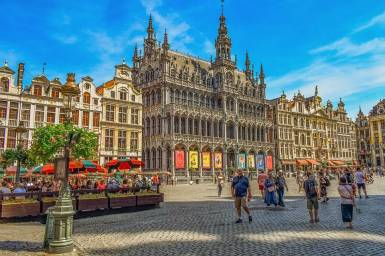Application Process for studying in Belgium
 Posted date: 15 Jun 2022
Posted date: 15 Jun 2022
Are you considering studying in Belgium? This article will make it simple for you to comprehend the procedure. The application process varies by field, program level, and institution, so if you have any specific queries, contact the institution of your choosing. Meanwhile, you can get started by following these steps!
Select a program.
This is the first thing you should do. Follow your interests while keeping your strengths in mind. What do you see yourself doing in the future? Do you want to study in Belgium's Dutch or French-speaking regions? Keep in mind that if you want to pursue undergraduate studies in either Dutch or French, you'll need to demonstrate your linguistic proficiency in one of the two languages. Determine the level of your studies, i.e., whether you want to pursue a Bachelor's, Master's, or Doctorate degree, and investigate the alternatives available at Belgian universities.
Examine the prerequisites for admission.
Different entry criteria apply to each program, based on the level of education and region. Some of them may require proof of advanced French or Dutch language skills, while others will merely require English language skills. Because educational institutions in different parts of Belgium have different criteria, you should contact the program coordinators of the universities of your choosing directly to learn more about the admission requirements.
Prepare the required paperwork.
It's time to start collecting the essential documentation for your application when you've decided which programs you want to apply for and what region you want to study in. It's best to start by contacting your nearest Belgian embassy or Consulate since they can guide you through the process and provide translation services in both Dutch and French. Documents required for the application process include:
-
Identification must be provided in the form of a personal identification card or a passport.
-
If you're applying for a Bachelor's degree, you'll need your upper secondary certificate.
-
If you're applying for a Master's degree, you'll need a copy of your bachelor's degree.
-
If you're applying for a Doctorate, you'll need a copy of your Master's degree.
-
An application form that has been completed and downloaded from each university's official website.
-
If you want to study in an English-taught program, you'll need to take the TOEFL or IELTS exam.
-
If you want to study in a French or Dutch-taught program, you'll need to take a language knowledge test (DELF or DALF) and a language proficiency test (Dutch NT2-II).
-
If appropriate, proof of application fee.
-
Letter of motivation stating why you want to learn in Belgium.
-
If necessary, letters of recommendation.
Send your application in.
Well done, you've completed the difficult task of obtaining all of the documentation! Now is the time to submit your application. In Belgium, you submit an electronic application to the university of your choice through their online registration platforms. However, you may be asked to transmit the original documents by mail to establish their legitimacy in some cases. The official authorities must sign and stamp the original documents. After you submit your application, the institution will review it and tell you whether or not you will need to take the admissions or aptitude exam.
Make an application for a student visa.
Congratulations! You have cleared the admissions test or met the admissions standards for a Belgian university. The next step is to apply as soon as possible for your undergraduate visa/residence permit. For more information, contact the Belgian Embassy or Consulate in your area.
Make your way to Belgium.
You've already received your acceptance and student visa. The only thing left to do is get your flight tickets to Belgium and begin looking for lodging. Choose whether you wish to live in a dormitory or in a residence hall with other students. Prepare to study in Belgium by packing your belongings.
Posted By

GSP Admin




